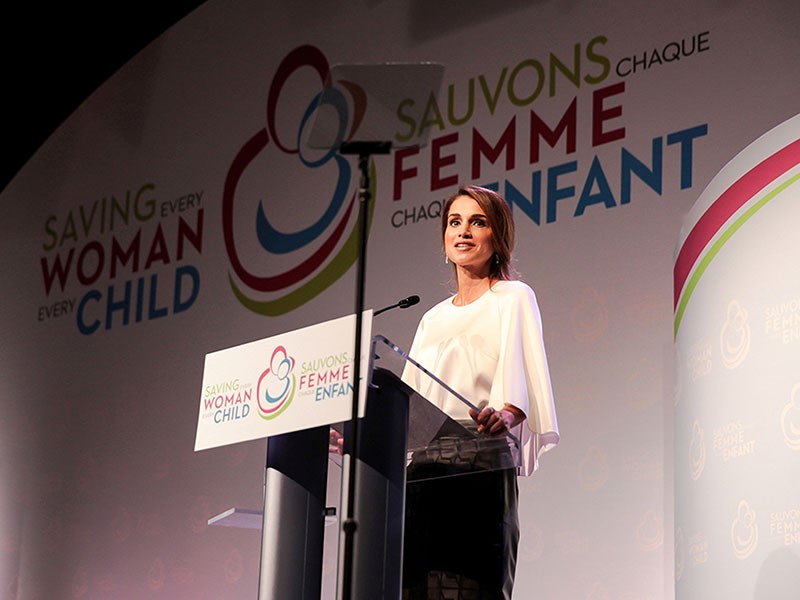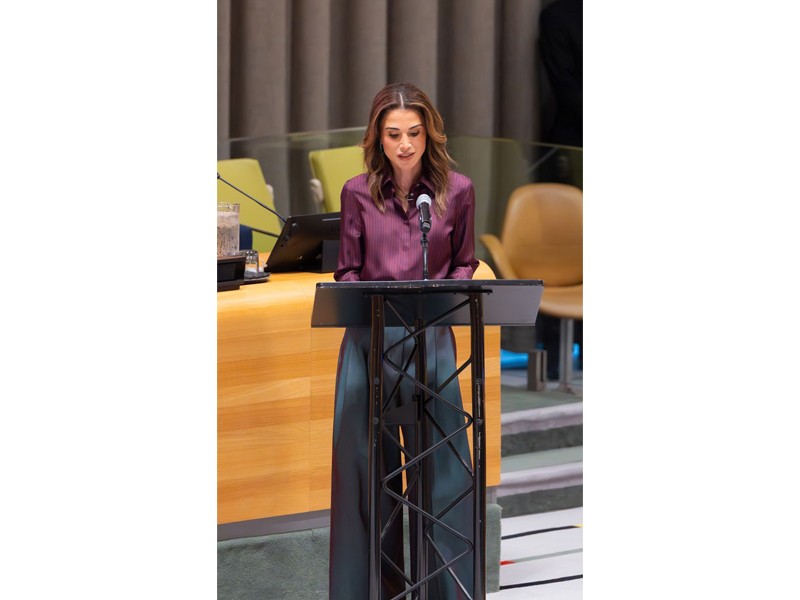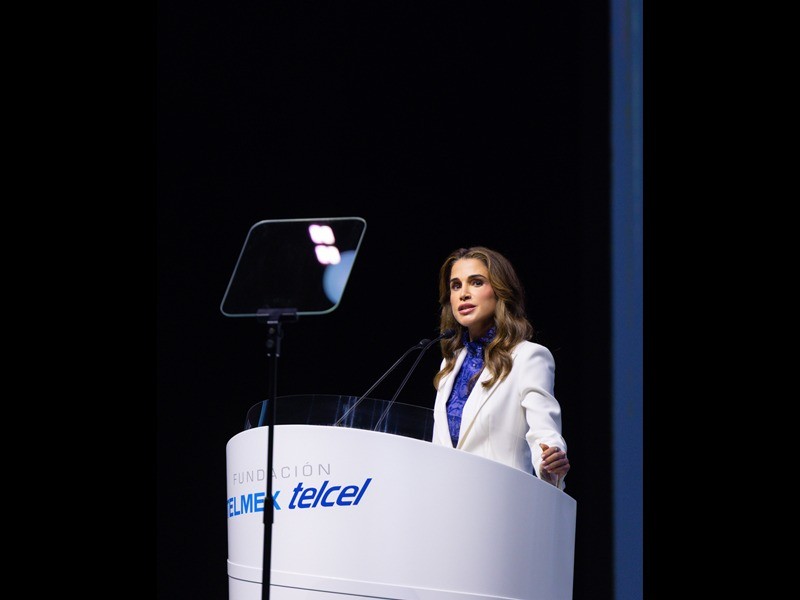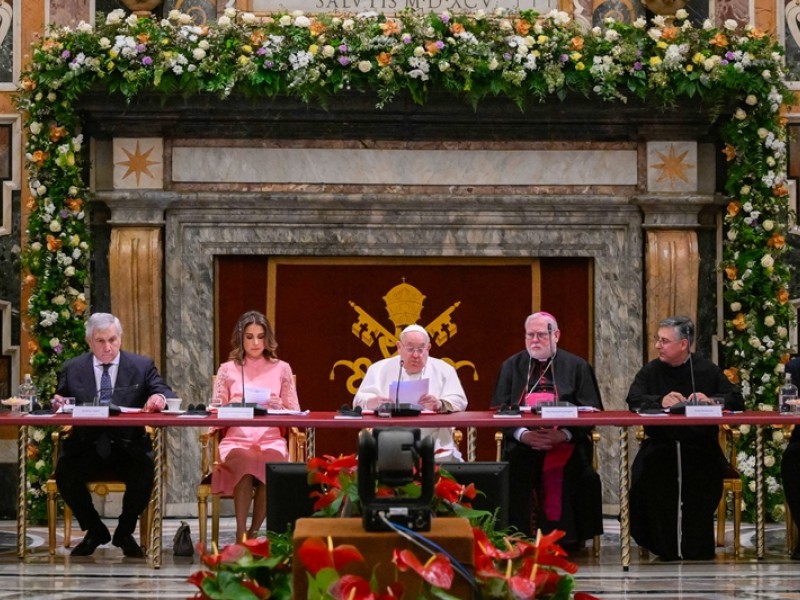Queen Rania's Speech at Saving Every Woman, Every Child Summit - Toronto, Canada
“Doing More Together Globally”

Your Highness, the Aga Khan…President Kikwete …Prime Minister Harper… Minister Paradis… honourable guests…ladies and gentlemen…
Thank you, Ms. Brown, for your warm words. It’s a pleasure to be here.
You introduced me as “Queen” but I have to tell you, I have a bigger title than “Queen”.
It’s “Mom.”
Mom to Hussein…Iman…Salma…and Hashem. That’s the title that matters most. There’s nothing more important than nurturing them…making them feel loved and secure …watching them grow up…and celebrating their milestones.
One such milestone will happen next week when my eldest daughter, Iman, graduates high school. I won’t lie. Half of me is apprehensive about seeing her go off to university. The other half is bursting with pride. It’s part of the emotional rollercoaster of being a mother…a parent. And I wouldn’t miss it for the world.
Every parent should be able to celebrate those milestone moments. From pregnancy…birth…and the first month of life…to that 5th birthday…that first day of school…and so many more.
And, in recent years, millions more parents have enjoyed those moments.
Since 1990, we’ve seen a 45% reduction in maternal deaths. The global under-five mortality rate has roughly halved.
Canada’s leadership has been central to this progress. The first Muskoka Initiative, galvanized global support to reduce maternal and child mortality.
I also know, from my work on the UNF Board, how the Secretary General’s dynamic global partnership, Every Woman, Every Child, has contributed to progress…by mobilizing governments, partners and NGOs on behalf of women and children.
And, as a proud advocate for UNICEF, I want to spotlight their great work in helping to reduce under-five mortality -- most recently through A Promise Renewed, the initiative which aims to end preventable child deaths.
But, for all our progress, the milestones of which I spoke are a distant dream for millions of mothers and their children. For them, milestones are measured not in triumphs but in tears…not in laughter but in loss…not in births but in burials.
Every minute and a half, a woman dies from complications of pregnancy or child-birth.
Every day, 18,000 children under-five die from causes we can prevent.
And every year, 2.9 million newborns die. That’s a little more than the population here in Toronto. An additional 2.6 million babies are stillborn. Another Toronto.
The mother of modern nursing, Florence Nightingale said, “Were there none who were discontented with what they have, the world would never reach anything better.”
Ladies and gentlemen, these figures are more than a source of ‘discontent’. They’re an outrage. An injustice. And they have no place in our common humanity.
So, thank you to Prime Minister Harper and the Canadian Government for being ‘discontented’ with the status quo and for helping us to ‘reach something better’.
So, how do we ‘reach something better?’
We can get behind the soon-to-be-launched Every Newborn Action Plan… which breathes new life into the UN’s Global Strategy for Women and Children’s Health.
Because while we’ve seen progress to reduce child deaths worldwide, neonatal deaths have declined at a slower pace – and, in some places, even increased.
As a mother, I know how precious those first days are. It breaks my heart to think that when babies are at their most helpless, we seem least able to help them. It’s all the more cruel because we know how to help them.
Up to two thirds of these deaths could be avoided if skilled health workers attended births and were on hand in the first week of life. The Action Plan is our best chance yet to change the birth of a child from something to be feared into what it should be: a cause for celebration.
To ‘reach something better’, we must reach into conflict-affected countries.
The civil war in Syria has shattered the health system. Care for pregnant women, mothers and their new-borns is, at best, precarious.
I’m thinking about the woman who gave birth on the doorstep of a hospital even as the hospital was bombed. Or the woman, just last month, forced to give birth on a Lebanese street because she couldn’t pay the hospital upfront. Or the woman so traumatized by the death of her husband and finding shelter for her family, that she went into labour at seven months. With no hospital nearby, friends helped to deliver her baby son. He lived for two hours.
In neighbouring countries, the absence of fighting is replaced with the agony of uncertainty. Last year, in Jordan, more than 10,000 Syrian babies were born refugees. Most new mothers look forward to taking their babies home. But for these mothers, there is no home. Nor hope.
Worse, yet. The majority of babies born as refugees don’t have their births officially registered. In Lebanon last October, only a quarter of the babies born had birth certificates.
These babies are, as Carl Sandburg tells us, “God’s opinion that the world should go on.” They are the future of Syria…the stability of the region. But, right now, the odds are stacked against them. They and their mothers desperately need your support.
The third way we can ‘reach something better’ is by investing in girls’ education.
Educated girls can transform nations; they’re troublesome like that. That’s why Boko Haram fear them…and why the Taliban shot Malala.
Girls just can’t keep education to themselves. They spread it around. They teach their mothers to read. They stand up for themselves and those around them. They get married later and send their children to school.
In fact, the child of a literate mother is 50% more likely to survive past the age of five than the child of a mother with no schooling.
So, let’s get girls into classrooms.
We can also ‘reach something better’ by putting girls and women at the heart of the post-2015 agenda.
As I just said: girls and women are the backbone of development progress. That’s why in my time on the High Level Panel, we urged that gender equality not only permeate all the new goals but, also, that it be a stand-alone goal.
And when I say, ‘girls and women’, I mean all girls and women. In slums. In remote foot-hills. In factories and quarries working all day long. In deserts searching for water. We must find them. We must give them tools to help them fulfill their potential and change mindsets.
If we don’t put girls and women at the heart of the post-2015 agenda, we’ll be having this same conversation 15 or 20 years from now…on our way to Muskoka… Number Nine!
Last. We can ‘reach something better’ by being more innovative.
The great thing about innovation is that it doesn’t always mean spending a lot of money. Quite the opposite, in fact.
Take the humble mobile phone. Reports suggest that, this year, the number of active cell phones will reach 7.3 billion. In other words, there will be more in-use cell phones than there are people on the planet right now. Two out of every three of these new mobile phone subscribers are women.
What does this mean for maternal, newborn and child health?
It means that women in the poorest communities, furthest from healthcare, can access basic medical information. It means that community health workers can track pregnancies and connect to doctors. In other words, it means, a doctor in their pocket…a prescription in their hand…and a healthier future at their fingertips.
Ladies and gentlemen, there are so many ways we can ‘reach something better’ for mothers, newborns and children – especially when we ‘do more together globally’.
So, let’s take inspiration, once more, from the mother of modern nursing who, when asked to what she attributed her success, said, “I never gave or took any excuse.”
Good advice.
No. More. Excuses.
Thank you.
موقع جلالة الملكة رانيا العبدالله الرسمي
هذا الموقع الإلكتروني لا يدعم متصفحات الإنترنت القديمة. الرجاء تحديث متصفح الإنترنت إلى نسخة أحدث من إنترنت إكسبلورر 9
متصفح الإنترنت الذي تستخدمه قديم. لتحسين مستوى الأمان عند تصفح مواقع الإنترنت و مشاهدتها بالشكل الصحيح و بفعالية افضل قم بتحديث متصفح الإنترنت الخاص بك



